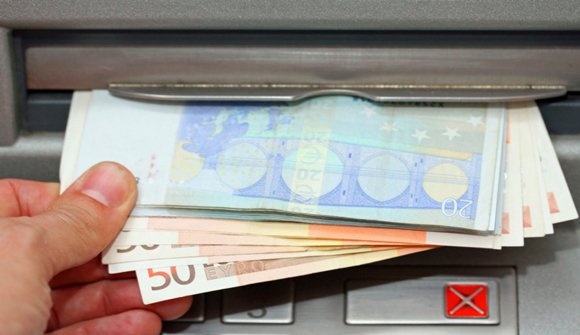
The European Central Bank says it is not increasing its emergency funding for Greek banks, amid fears that Greece may default on its debts on Tuesday.
The decision not to raise the cap on aid to Greece increases the likelihood of bank closures and restrictions on cash withdrawals, analysts say.
That in turn could eventually result in Greece leaving the euro.
The ECB said that it stood ready to review the decision and would work closely with the Bank of Greece.
The current ceiling for the ECB's emergency funding – Emergency Liquidity Assistance (ELA) – is €89bn (£63bn). It is not clear if all that money has been disbursed.
Those funds are used by banks to provide cash to depositors who want their money back.
The ELA decision may mean Greek banks do not open on Monday to prevent a run ahead of the imposition of capital controls, BBC economics editor Robert Peston says,
That would be a significant step towards Greece leaving the euro, though it would not make it inevitable, he says. – BBC News, June 28, 2015
Fractional reserve banking is intrinsically dishonest. Bankers promise depositors instant access to their money, even as they lend that same money to unrelated persons. The depositor agreement is a contract the bank knows it cannot possibly fulfill.
This pyramid-scheme business model would be unsustainable without the backstop of a central bank as "lender of last resort." Bank runs are (theoretically) impossible if the central bank does its job.
The European Central Bank is failing one of its member countries this week. Greek banks are closed after the ECB cut off funding over the weekend. Depositors drained ATM machines in a vivid illustration of the very behavior the ECB is supposed to stop.
For its part, the ECB argues it had no choice because Greek banks had been abusing its rules. If so, then its rules are irrational. The rules should stop banker misbehavior before depositors lose access to their money. As it is now, the ECB is punishing Greek citizens who had nothing to do with how the banks operate.
A similar bank holiday occurred in Cyprus in 2013, costing large depositors a portion of the money they had placed in supposedly stable and well-backstopped (by the ECB) banks. Central bank defenders could argue, somewhat plausibly, that this was an odd situation in a very small country. Making that argument for Greece is considerably harder.
So, we now have two examples in three years of a major central bank simply walking away from its supposedly most fundamental obligation. The lies upon which fractional reserve banking exists are beginning to catch up to it.
Citizens everywhere in the Eurozone now have good reason to wonder if their banks will be next. After Cyprus and Greece, why should anyone believe anything the ECB says?
Greeks stopped believing it months ago. One clue was a 47% jump in April automobile sales. Why would car sales boom in a country with double-digit unemployment? People were desperate to get their money out of the banking system. You can only store so much cash in the mattress, so Greeks turned to new cars as an easily available hard asset.
It was a good move for those who did it; a €25,000 car in a Greek garage is worth more than €25,000 euros in a shuttered Greek bank. Gold and silver coins would have been even better, of course, but maybe cars were more readily available.
If the ECB is willing to shut banks in a crisis, what assurance do we have that the Bank of England, Federal Reserve or the Bank of Japan won't do the same? Answer: None. Today's highly leveraged banks can fail very fast, stretching the capacity of even the strongest central banks.
This is what happens when honest money disappears. The good news is that the whole world can see it happening. The bad news will come if depositors elsewhere do what logic tells them and stop trusting their own banks. Greece could be the first bullet in a long, ugly battle.
